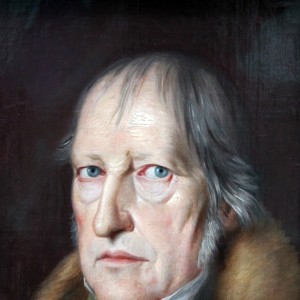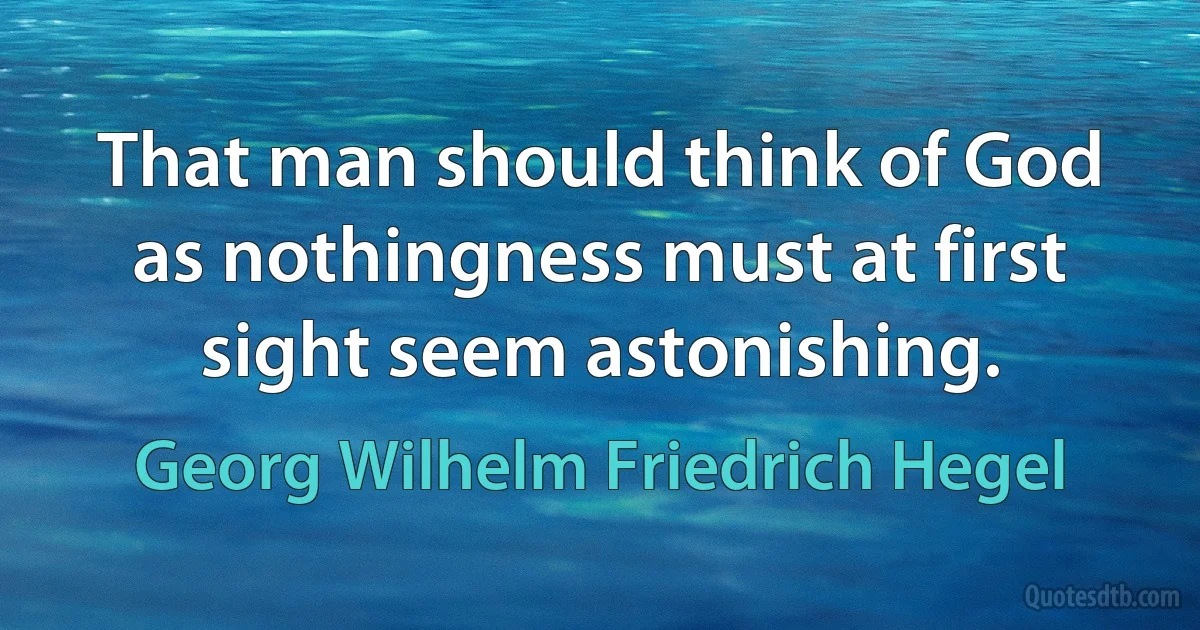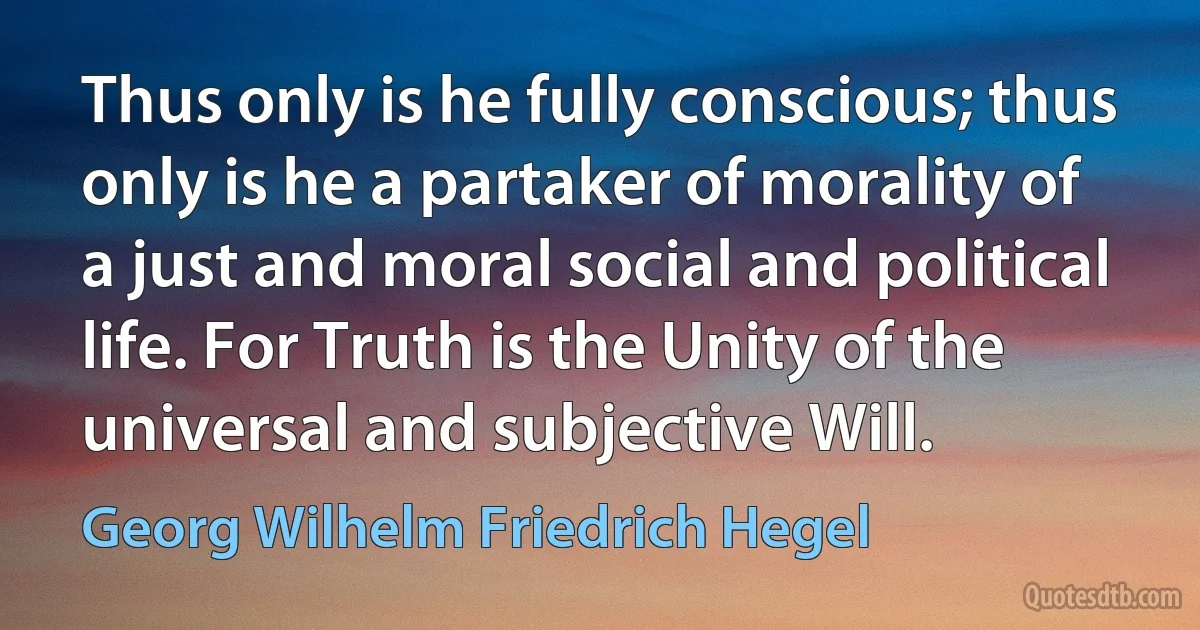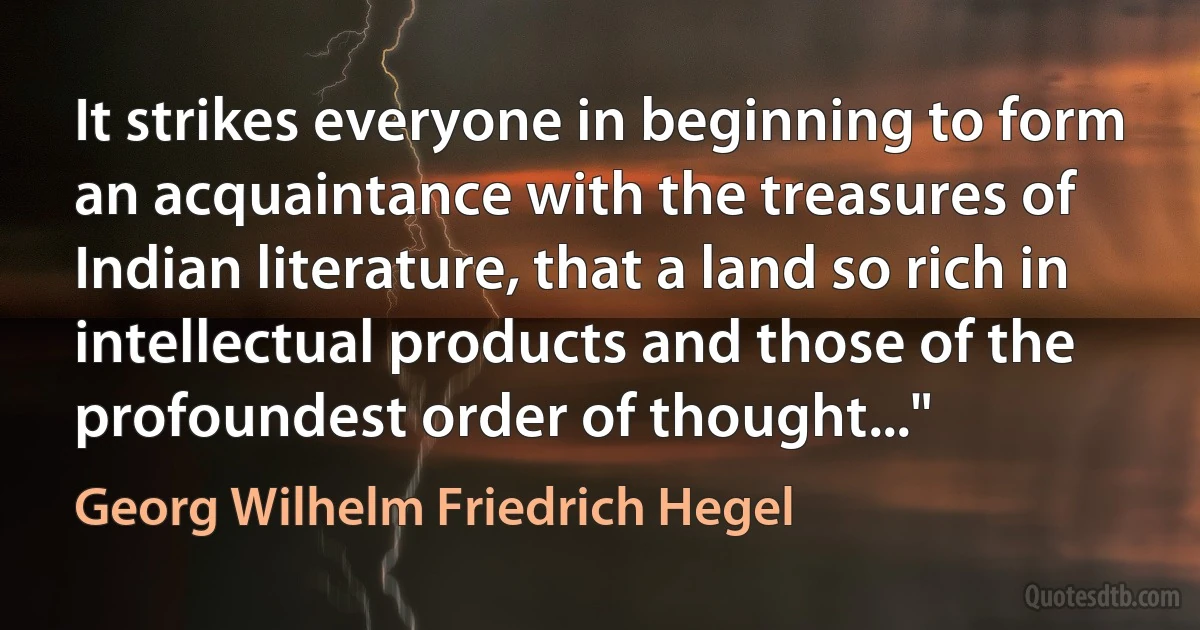Georg Wilhelm Friedrich Hegel quotes - page 5
Georg Wilhelm Friedrich Hegel was a German philosopher, widely regarded as one of the most influential figures in Western philosophy. His work shaped the development of idealism, dialectics, and theories of history and society. He remains a central figure in philosophy, inspiring thinkers across many disciplines. Here are 126 of his quotes:
The good is the idea, or unity of the conception of the will with the particular will. Abstract right, well-being, the subjectivity of consciousness, and the contingency of external reality, are in their independent and separate existences superseded in this unity, although in their real essence they are contained in it and preserved. This unity is realized freedom, the absolute final cause of the world.

Georg Wilhelm Friedrich Hegel
The first glance at History convinces us that the actions of men proceed from their needs, their passions, their characters and talents; and impresses us with the belief that such needs, passions and interests are the sole springs of action - the efficient agents in this scene of activity. Among these may, perhaps, be found aims of a liberal or universal kind - benevolence it may be, or noble patriotism; but such virtues and general views are but insignificant as compared with the World and its doings. We may perhaps see the Ideal of Reason actualized in those who adopt such aims, and within the sphere of their influence; but they bear only a trifling proportion to the mass of the human race; and the extent of that influence is limited accordingly. Passions, private aims, and the satisfaction of selfish desires, are on the other hand, most effective springs of action.

Georg Wilhelm Friedrich Hegel
He produces Himself of His own act, appears as Being for "Other”; He is, by His own act, the Son; in the assumption of a definite form as the Son, the other part of the process is present, namely, that God loves the Son, posits Himself as identical with Him, yet also as distinct from Him.

Georg Wilhelm Friedrich Hegel
The Individual living in this unity has a moral "life; possesses a value that consists in this substantiality alone. Sophocles in his Antigone, says, "The divine commands are not of yesterday, nor of to-day; no, they have an infinite existence, and no one could say whence they came." The laws of morality are not accidental, but are the essentially Rational. It is the very object of the State that what is essential in the practical activity of men, and in their dispositions, should be duly recognized; that it should have a manifest existence, and maintain its position. It is the absolute interest of Reason that this moral Whole should exist; and herein lies the justification and merit of heroes who have founded states, however rude these may have been. In the history of the World, only those peoples can come under our notice which form a state. For it must be understood that this latter is the realization of Freedom, i.e. of the absolute final aim, and that it exists for its own sake.

Georg Wilhelm Friedrich Hegel
Spirit, on the contrary, may be defined as that which has its center in itself. It has not a unity outside itself, but has already found it; it exists in and with itself. Matter has its essence out of itself; Spirit is self-contained existence (Bei-sich-selbst-seyn). Now this is Freedom, exactly. For if I am dependent, my being is referred to something else which I am not; I cannot exist independently of something external. I am free, on the contrary, when my existence depends upon myself. This self-contained existence of Spirit is none other than self-consciousness consciousness of one's own being. Two things must be distinguished in consciousness; first, the fact that I know; secondly, what I know. In self-consciousness these are merged in one; for Spirit knows itself. It involves an appreciation of its own nature, as also an energy enabling it to realise itself; to make itself actually that which it is potentially.

Georg Wilhelm Friedrich Hegel
Universal History exhibits the gradation in the development of that principle whose substantial purport is the consciousness of Freedom. The analysis of the successive grades, in their abstract form, belongs to Logic; in their concrete aspect to the Philosophy of Spirit.

Georg Wilhelm Friedrich Hegel
An Englishman who, by a most careful investigation into the various representations, has sought to discover what is meant by Brahma, believes that Brahma is an epithet of praise, and is used as such just because he is not looked on as being himself solely this One, but, on the contrary, everything says of itself that it is Brahma. I refer to what Mill says in his History of India.

Georg Wilhelm Friedrich Hegel
The great thing however is, in the show of the temporal and the transient to recognize the substance which is immanent and the eternal which is present. For the work of Reason (which is synonymous with the Idea) when considered in its own actuality, is to simultaneously enter external existence and emerge with an infinite wealth of forms, phenomena and phases - a multiplicity that envelops its essential rational kernel with a motley outer rind with which our ordinary consciousness is earliest at home. It is this rind that the Concept must penetrate before Reason can find its own inward pulse and feel it still beating even in the outward phases. But this infinite variety of circumstances which is formed in this element of externality by the light of the rational essence shining in it - all this infinite material, with its regulatory laws - is not the object of philosophy....To comprehend what is, is the task of philosophy: and what is is Reason.

Georg Wilhelm Friedrich Hegel
A philosophy without heart and a faith without intellect are abstractions from the true life of knowledge and faith. The man whom philosophy leaves cold, and the man whom real faith does not illuminate, may be assured that the fault lies in them, not in knowledge and faith. The former is still an alien to philosophy, the latter an alien to faith.

Georg Wilhelm Friedrich Hegel
Only one word more concerning the desire to teach the world what it ought to be. For such a purpose philosophy at least always comes too late. Philosophy, as the thought of the world, does not appear until reality has completed its formative process, and made itself ready. History thus corroborates the teaching of the conception that only in the maturity of reality does the ideal appear as counterpart to the real, apprehends the real world in its substance, and shapes it into an intellectual kingdom. When philosophy paints its grey in grey, one form of life has become old, and by means of grey it cannot be rejuvenated, but only known. The owl of Minerva takes its flight only when the shades of night are gathering.

Georg Wilhelm Friedrich Hegel
Georg Wilhelm Friedrich Hegel
 Occupation: German Philosopher
Occupation: German Philosopher
Born: August 27, 1770
Died: November 14, 1831
Quotes count: 126
Wikipedia: Georg Wilhelm Friedrich Hegel












